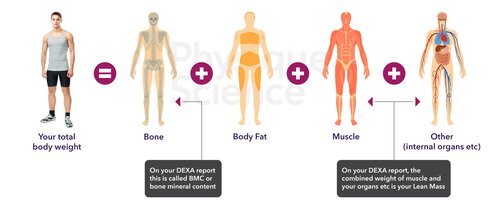
Optimizing Health: Understanding Body Composition
In the pursuit of overall well-being, our understanding of health goes beyond mere numbers on a scale. It extends into the realm of body composition, a crucial aspect often overshadowed by the fixation on weight. Let’s delve into the intricacies of body composition and explore how it impacts our health journey.
Breaking it Down: What is Body Composition?
Body composition is the proportion of fat and non-fat mass in your body. It encompasses not just weight, but the distribution of muscle, bone, and organs. While traditional weight measurements may not differentiate between muscle and fat, understanding body composition provides a more accurate representation of your health status.
Muscle vs. Fat: The Crucial Distinction
One of the key components of body composition is the distribution of muscle and fat. Muscle, being more dense than fat, takes up less space in the body. This is why two individuals with the same weight may look drastically different. Understanding this distinction is vital for those aiming to build a healthier physique.
The Impact on Metabolism: Why It Matters
Body composition plays a pivotal role in determining metabolic rate. Muscles are metabolically active tissues, meaning they burn more calories at rest compared to fat. Therefore, individuals with a higher muscle mass tend to have a more efficient metabolism. This insight is invaluable for those seeking sustainable weight management.
Beyond Aesthetics: Health Implications of Body Composition
While many associate body composition with aesthetics, its significance extends far beyond appearance. An optimal body composition is linked to a reduced risk of various health issues, including diabetes, cardiovascular diseases, and even certain types of cancer. Focusing on achieving a balanced body composition contributes to both physical and metabolic well-being.
Strategies for Improving Body Composition
Now that we understand the importance of body composition, the next question is: how can we improve it? Incorporating a combination of resistance training, cardiovascular exercise, and a balanced diet is essential. These lifestyle changes not only help in reducing fat but also in building and preserving muscle mass.
Body Composition Analysis Tool: A Helpful Resource
For those keen on delving deeper into their own body composition, consider using a reliable analysis tool. At Body Composition, you can find valuable insights into your current body composition. This resource provides a comprehensive understanding, enabling you to make informed decisions on your fitness journey.
The Role of Nutrition: Fueling Your Body Wisely
Nutrition plays a pivotal role in achieving and maintaining optimal body composition. A well-balanced diet that includes an adequate amount of protein, healthy fats, and complex carbohydrates is essential. Understanding your body’s nutritional needs can aid in the development of a sustainable and effective nutrition plan.
Mind and Body Connection: Stress and Its Impact
Stress, both physical and mental, can significantly influence body composition. Chronic stress triggers the release of cortisol, a hormone that promotes fat storage, particularly in the abdominal area. Incorporating stress-management techniques, such as meditation or regular exercise, is crucial for maintaining a healthy body composition.
The Journey to Optimal Health: A Holistic Approach
In conclusion, achieving optimal health goes beyond the numbers on a scale. It involves understanding and actively managing your body composition. By focusing on building muscle, reducing fat, and adopting a holistic approach to well-being, you pave the way for a healthier and more vibrant life. So, embark on your journey towards optimal health with a newfound appreciation for the intricacies of body composition.
